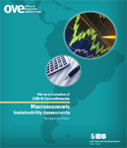IDB-9: Macroeconomic Sustainability Assessments
Date
Mar 2013
One of the most debated parts of the IDB-9 Agreement was the requirement that the Inter-American Development Bank (IDB or Bank) enhance its macroeconomic analysis and link it to its country programming to avoid lending in unsustainable macroeconomic situations. The IDB-9 Agreement mandated that the Chief Economist prepare annual Macroeconomic Sustainability Assessments for each borrowing country and that a positive judgment on sustainability is one of the prerequisites, among others, for maintaining the Bank's aggregate exposure with the country including both sovereign and non-sovereign operations. OVE finds that the MSA requirement has been substantially implemented but faces many difficulties that seriously impede its likely effectiveness. The quality of the MSAs, though reasonable given the resources allocated, lacks depth in many areas, particularly financial sustainability and inflation. More generally, there is no methodology that could reliably do what is expected: predict macroeconomic crises in the near term. There are few checks and balances in the system, and none relating to the Chief Economist's conclusion and determination of sustainability. The MSA process entails significant costs for the Bank, including in country relations and IDB Board cohesion and collaboration. Though the MSA process has the potential to further the underlying IDB-9 goal of preventing lending in unsustainable macroeconomic situations, the process will not achieve the broader objective of stopping increases in Bank exposure for the foreseeable future: existing IDB disbursement and repayment schedules will lead to increasing exposure in almost all borrowing countries in the coming 5-10 years. OVE suggests that the Governors, the Board, and Management reconsider the design of the MSA process to align benefits and costs more closely. A useful way to think about changes is to "unbundle" the two rationales for MSAs -limiting IDB's credit risk and promoting development effectiveness. The credit risk rationale argues for the type of short-term focus and yes-no decision-making used in the MSAs, and Management may wish to strengthen the ability of its risk management group to perform independent credit risk assessment of the sovereign portfolio. The development rationale argues for a more medium-term instrument with a broader focus, as macroeconomic policies are not the only ones that matter for development. One option would be to strengthen the Bank's Independent Macroeconomic Assessments for policy-based lending, with clear guidelines to ensure their effective coverage and implementation. IDB could also strengthen its macroeconomic and policy analysis through its regular program of economic and sector work. It is clearly feasible for the IDB to have a stronger role than it now has in policy analysis and advice to its borrowing countries.



